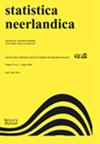Inference for Kumaraswamy‐G family of distributions under unified progressive hybrid censoring with partially observed competing risks data
IF 0.8
3区 数学
Q2 STATISTICS & PROBABILITY
引用次数: 0
Abstract
In this study, statistical inference for competing risks model with latent failure times following the Kumaraswamy‐G (Kw‐G) family of distributions under a unified progressive hybrid censoring (UPHC) scheme is developed. Maximum likelihood estimates (MLEs) of the unknown model parameters are obtained, and their existence and uniqueness properties are discussed. Using the asymptotic properties of MLEs, the approximate confidence intervals for the model parameters are constructed. Further, Bayes estimates with associated highest posterior density credible intervals for the model parameters are developed under squared error loss function with informative and noninformative priors. These estimates are obtained under both restricted and nonrestricted parameter spaces. Moreover, frequentist and Bayesian approaches are developed to test the equality of shape parameters of the two competing failure causes. The comparison of censoring schemes based on different criteria is also discussed. Monte Carlo simulation studies are used to evaluate the performance of the proposed statistical inference procedures. An electrical appliances data set is analyzed to illustrate the applicability of the proposed methodologies.库马拉斯瓦米-G 系列分布在统一渐进混合删减法下的推断,以及部分观察到的竞争风险数据
本研究在统一渐进混合删减(UPHC)方案下,建立了具有潜在失败时间的库马拉斯瓦米-G(Kw-G)族分布的竞争风险模型的统计推断。得到了未知模型参数的最大似然估计值(MLE),并讨论了它们的存在性和唯一性。利用 MLE 的渐近特性,构建了模型参数的近似置信区间。此外,在有信息和无信息先验的平方误差损失函数下,建立了模型参数的贝叶斯估计和相关最高后验密度可信区间。这些估计值是在受限和非受限参数空间下获得的。此外,还开发了频数法和贝叶斯法来检验两种相互竞争的故障原因的形状参数是否相等。此外,还讨论了基于不同标准的剔除方案的比较。蒙特卡罗模拟研究用于评估所提出的统计推断程序的性能。对一个电器数据集进行了分析,以说明建议方法的适用性。
本文章由计算机程序翻译,如有差异,请以英文原文为准。
求助全文
约1分钟内获得全文
求助全文
来源期刊

Statistica Neerlandica
数学-统计学与概率论
CiteScore
2.60
自引率
6.70%
发文量
26
审稿时长
>12 weeks
期刊介绍:
Statistica Neerlandica has been the journal of the Netherlands Society for Statistics and Operations Research since 1946. It covers all areas of statistics, from theoretical to applied, with a special emphasis on mathematical statistics, statistics for the behavioural sciences and biostatistics. This wide scope is reflected by the expertise of the journal’s editors representing these areas. The diverse editorial board is committed to a fast and fair reviewing process, and will judge submissions on quality, correctness, relevance and originality. Statistica Neerlandica encourages transparency and reproducibility, and offers online resources to make data, code, simulation results and other additional materials publicly available.
 求助内容:
求助内容: 应助结果提醒方式:
应助结果提醒方式:


